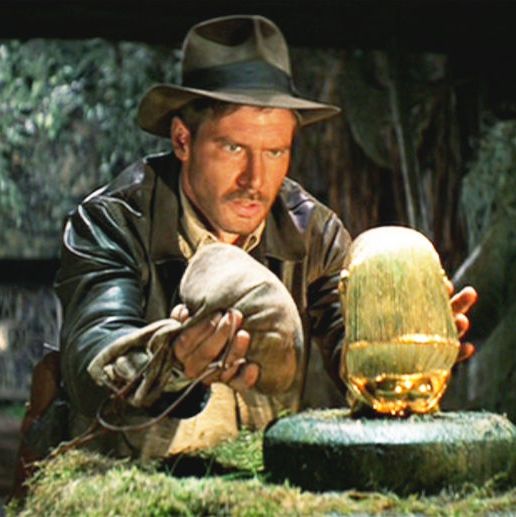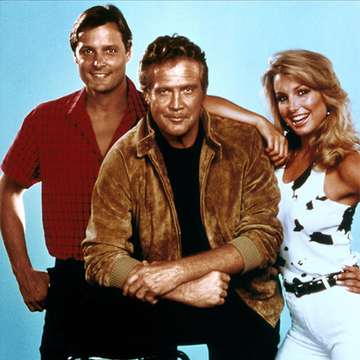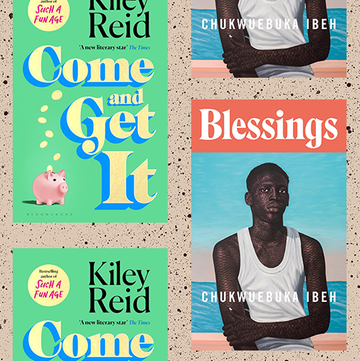Alec Guinness wrote to his friend Anne Kauffman at a low ebb. The scripts for this new film he'd signed on for were dross, but still more and more new sides kept arriving. He would, at least, not have to do any of the usual promotion rounds. That, and a double salary, had got him to accept the role.
“I must off to studio and work with… Mark Hamill and Tennyson (that can’t be right) Ford,” he wrote. “Ellison (? – No!) – well, a rangy, languid young man who is probably intelligent and amusing.”
It’s understandable that Guinness was unaware of him. In 1975, Ford was a self-taught carpenter who knocked up bits and pieces for, among others, Joan Didion and her husband. Five years after being a woodworker, literally everyone knew who he was.
Even in tiny early parts in The Conversation as the menacing Martin Stett or as American Graffiti’s Bob Falfa, he was like an anti-Robert Redford: unwholesome, cynical, living on the side of the shadows. That, combined with an enthusiasm for getting stuck into stunts, made him a very particular action hero; wry enough to ground anything daft, sincere enough to sell the fantastical.
Now, as he turns 80, we’re celebrating by ranking his 20 best films.
20. Force 10 From Navarone (1977)
A funny one this: so many good moving parts, but so rarely moving together. Guy Hamilton, who directed four Bond films, Robert Shaw, Barbara Bach and Ford’s Dambusters-style World War Two yarn thrills in fits and starts, but Ford thought little of it.
19. American Graffiti (1973)
Very much ‘a good film with Harrison Ford in it’ rather than ‘a good Harrison Ford film’ – which is also why Apocalypse Now isn’t here, soz – George Lucas’ pie-eyed and cherry-cheeked evocation of a single night in the lives of four friends getting ready to split for college in 1962 features Ford as strip-racer Bob Falfa. The early Ford swagger is in full evidence, as is his luck in hooking up with a visionary director.
18. K-19: The Widowmaker (2002)
This Soviet submarine thriller sank without trace at the box office, but there’s a lot of daftness to enjoy. After a decade having a lot of success playing bastions of American state competence (see: Patriot Games, Clear and Present Danger, Air Force One) he defected to Russia for Kathryn Bigelow’s atmospheric if slightly ploddily scripted period piece.
17. Sabrina (1995)
Ford’s career has been pockmarked by stretches where he can’t buy a hit, but this remake of Billy Wilder’s 1954 classic with Audrey Hepburn is worth a second look. It’s a nice little film about a high society love triangle which shows off Ford’s comic timing, even if you’d be hard pushed to call it essential.
16. Star Wars: The Force Awakens (2015)
Forget, for a moment, the hate campaigns and the confused, soggy conclusion to the sequel trilogy, and recall how much fun The Force Awakens felt at the time. Returning as Han Solo, Ford carried a lot of the weight of the original trilogy, and got the big, emotional conclusion that Return of the Jedi ducked in favour of hanging with the Ewoks.
15. The Age of Adaline (2013)
In the last 20 years, Ford’s choices have felt a little bit scattershot: a few action man cameos, a sci-fi dud or two. Then there’s this high-concept relationship drama about Adaline (Blake Lively) who stopped ageing at 29 and now lives on the run. Ford is her former lover who suddenly recognises her, and he gets to access some Big Acting gears here. Quietly impressive.
14. Clear and Present Danger (1994)
It might sound a bit odd for us in the UK, but the actor playing Tom Clancy’s CIA lunk Jack Ryan really, really matters to some people in the US. Ford makes a very good fist of it in the second of the three adaptations he did, even if during his fight against Columbian drug cartels Jack Ryan never really looks like he’s in much more than mild peril.
13. Working Girl (1988)
Dipping into the lesser-spotted Harrison ‘Chuckles’ Ford persona, Mike Nichols’ corporate love triangle comedy sees Melanie Griffith as Tess, an honest, ambitious secretary who scrambles up the greasy pole any which way she can. Sigourney Weaver is deliciously horrible as the boss trying to keep her down, and Ford the brow-furrowing big shot both want to impress.
12. Frantic (1988)
Frantic sees him on the hunt for his apparently kidnapped wife, with nothing to help him get through to the organised crime syndicates of Paris except a drug smuggler and the most rudimentary ou-est-mon-wife schoolboy French. It’s a bit like Taken, but as the title implies it’s a bit more about the emotional turmoil and bit less about the smacking up bad lads.
11. Presumed Innocent (1987)
The first in a run of superior thrillers that define the middle period of Ford’s career, this knotty legal-slash-relationship drama got some of The West Wing together before Jed Bartlett took office. ‘Rusty’ Sabich is put on the murder case of a woman who he’d been having an affair with, but the clues don’t add up. It’s a twisty, tricksy, ultimately satisfying thing.
10. Air Force One (1997)
Let’s park the fact that Donald Trump loves Air Force One just for a moment and look at it as the convergence of a re-energised Ford and Gary Oldman in his campiest, shoutiest phase. Oldman is a Soviet loyalist who’s pissed off that the Union collapsed and wants his beloved dictator released; Ford is President James Marshall, hiding in the belly of the presidential plane and John McClane-ing his way to his family.
9. Witness (1985)
A young Amish boy witnesses a murder in the bogs of a Philadelphia train station, and is assigned the guy most kids would choose to shield them from evil: Harrison Ford. The pivot at halfway from city-bound grit to a thoughtful exploration of a society apart is unexpected but it’s all poignant and rather lovely.
8. Blade Runner 2049 (2017)
It should have been impossible to make a worthy sequel to Blade Runner. But as engaging and gorgeous as Denis Villeneuve’s faintly miraculous film is for its first 90 minutes, it’s when Ryan Gosling’s K finds Ford’s Deckard out in a smog-filled and ruined Las Vegas that it all kicks into gear.
7. Indiana Jones and the Last Crusade (1989)
After things took a deeply yikes-y turn in Temple of Doom, Ford and Sean Connery – an apt piece of casting given how much the Indy stories leant on his early James Bond films – teamed up to make sure the Nazis didn’t live forever while sorting out Indy’s daddy issues. Just so, so much fun.
6. What Lies Beneath (2000)
Part psychological thriller, part whodunnit, part supernatural horror, Ford and Michelle Pfeiffer are a couple who see some new neighbours pitch up in their quiet Vermont neighbourhood, only for the wife of the couple to suddenly disappear. Pfeiffer tries to riddle it out, but gets in deep water. This marks the first time Ford played a proper, no-holds-barred bastard.
5. The Fugitive (1993)
This is, at its heart, a neo-Hitchcockian thriller, all about the little man who has to get to the heart of the conspiracy he’s being framed by in order to prove his innocence, all the while staying out of the clutches of a manhunt. What The Fugitive has that, say, The 39 Steps or North By Northwest don’t have is Tommy Lee Jones taking great, wrenching chunks out of every available piece of piece of scenery as hardnut US Marshal Sam Gerard, who thinks Ford’s Dr Richard Kimble killed his wife and went on the run. Brilliantly taut and tightly plotted.
4. Star Wars (1977)
On reading one of George Lucas’ scripts, Ford pointed out to him that “you can type this shit, but you sure can’t say it”. Indeed, the first sentence of Lucas’ first outline sold itself as “the story of Mace Windu, a revered Jedi-bendu of Opuchi who was related to Usby CJ Thape, padawaan learner of the famed Jedi”.
Han Solo is essential to making the gibberish work. He’s the utter prick who only does stuff for other people when his gigantic bear friend who also acts as his conscience tells him to, is the culmination of all the charming, handsome bastards Ford played in his early career.
He’s the bullshit detector who could, at any point, fuck the whole gang off and get back to his beloved smuggling. And then, as he gets lured in by the power of The Force, so are we.
3. The Empire Strikes Back (1980)
In the carbon-freezing chamber, Harrison Ford and director Irving Kershner are trying to work something out. “As I pass by her,” Ford tells Kershner. “I think Leia ought to say very simply, “I love you.”
Kersner likes it. “And you say, ‘Just remember that, Leia, because I’ll be back.’ You’ve got to say, ‘I’ll be back.’ You must. It’s almost contractual!
Ford thinks briefly. “If she says ‘I love you,’ and I say ‘I know,’ that’s beautiful and acceptable and funny.”
George Lucas hated the line and wanted to chuck it out, until he saw a test screening where the audience raved about it. There, in a nutshell, is the instinct for what movie audiences want that made Ford a star.
2. Raiders of the Lost Ark (1981)
It’s not often in cinema that two people on ridiculous hot streaks work together at the same time and make something worthy of both of them. But between Jaws and Poltergeist, Steven Spielberg was on one of the hottest streaks ever; after Star Wars and The Empire Strikes Back, Ford was on a roll too. Raiders started to come together properly when Spielberg and Lucas made sandcastles together on a beach in Maui, Hawaii, while Lucas hid from Star Wars, which he’d assumed would be a massive flop. Lucas wanted to pay tribute to the 1930s action-adventure serials they watched on Saturday mornings, and he wanted Tom Selleck. Thanks to Selleck being in Magnum PI, Ford got a run at it, effortlessly knitting together Old Hollywood derring-do and New Hollywood cynicism.
1. Blade Runner (1982)
For a man who’s been in the middle of two of the biggest cash-hoovers in Hollywood, it’s odd that the creative peak of Ford’s career looked at the time like an odd misstep in his ludicrous run of megahits between Star Wars and Witness. But it’s testament to quite how extraordinarily vivid the world and ideas of Ridley Scott’s sci-fi neo-noir Blade Runner remain that despite having been mangled with different cuts, extra voiceovers and internal wrangling (he and Scott can’t even agree on whether Rick Deckard is a human or a replicant – Ford and pretty much everyone else says human; Scott says he could be either) it still feels like a glimpse of the future. Its central question – what makes a human human, and is it possible to lose or manufacture it? – has only become more pressing, too. Deckard is a cop on the tail of some rogue replicants, or synthetic humans, in near-future LA. They want their freedom, and soon Deckard has to reckon with what it means to really live. Big, big stuff.













